|
The Ex, "Turn"
Touch and Go
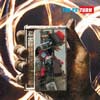 The Dutch collective known for their anarchist/punk-based, communal, and musical style mishmoshing tendencies blast out a powerful two-LP/CD set of all new material. Engineered once again by Steve Albini in Chicago, Turn could easily be the strongest album of the year. In the three years since their last full-length recording, Dizzy Spells, the Ex have kept busy touring places on this planet most people would be afraid to go, making a few ATP appearances, collaborating on more In the Fishtank recordings, and working in various combinations on other peoples records. The message on Turn is loud (ear bleedingly loud) and clear. From the first minute, main vocalist GW Sok shouts about how the need for artists, scientists, and humanitarians is much more important than weapons of mass destruction and wars. (And I'm pretty sure that "The shrub who took himself for a park" is most likely mister "Bush" who mistakenly thinks he represents the world.) Each song is executed with a relentless pounding of guitars and drums and the messages are stories and reflections about greed and consumption, unrest, and even the Pie-in-the-face gang. It's a clear example that music which calls for social awareness and/or change is much more effective when made with such an unavoidable vigor and not by some timid hippie with acoustic guitar. The angular guitars, in-your-face drums, rock cello, and punk vocals are flawless, like a well-slicked machine, perfected through numerous live performances. After a surprising 25 years of existence, The Ex have no signs of becoming stale, tame, or rusty; challenging themselves to bring completely new ideas into the mix. One of my favorite songs is an aural souvenir from their travels to Ethiopia. "Huriyet," a powerful song about the liberation of the Erythreans, features drummer Katherina on the main vocals as most of the rest of the band clap and respond. Although I don't have a cheat-sheet to decode the lyrics, it is quite a moving experience, as the feeling is seemingly not about despair, but about the ability for people to overcome (from a remarkable place known for its Christian and Muslim populations living side by side in peace for centuries). The accompanying booklet includes lyrics and a bunch of great photos including pictures from Africa, animals, and, of course, a pie in the face. The Ex needs to be experienced and nobody has ever told me they were let down by their intense live show. For those who can't and missed the Eye special, it's highly recommended to go back and check it out agian. - Jon Whitney
The Dutch collective known for their anarchist/punk-based, communal, and musical style mishmoshing tendencies blast out a powerful two-LP/CD set of all new material. Engineered once again by Steve Albini in Chicago, Turn could easily be the strongest album of the year. In the three years since their last full-length recording, Dizzy Spells, the Ex have kept busy touring places on this planet most people would be afraid to go, making a few ATP appearances, collaborating on more In the Fishtank recordings, and working in various combinations on other peoples records. The message on Turn is loud (ear bleedingly loud) and clear. From the first minute, main vocalist GW Sok shouts about how the need for artists, scientists, and humanitarians is much more important than weapons of mass destruction and wars. (And I'm pretty sure that "The shrub who took himself for a park" is most likely mister "Bush" who mistakenly thinks he represents the world.) Each song is executed with a relentless pounding of guitars and drums and the messages are stories and reflections about greed and consumption, unrest, and even the Pie-in-the-face gang. It's a clear example that music which calls for social awareness and/or change is much more effective when made with such an unavoidable vigor and not by some timid hippie with acoustic guitar. The angular guitars, in-your-face drums, rock cello, and punk vocals are flawless, like a well-slicked machine, perfected through numerous live performances. After a surprising 25 years of existence, The Ex have no signs of becoming stale, tame, or rusty; challenging themselves to bring completely new ideas into the mix. One of my favorite songs is an aural souvenir from their travels to Ethiopia. "Huriyet," a powerful song about the liberation of the Erythreans, features drummer Katherina on the main vocals as most of the rest of the band clap and respond. Although I don't have a cheat-sheet to decode the lyrics, it is quite a moving experience, as the feeling is seemingly not about despair, but about the ability for people to overcome (from a remarkable place known for its Christian and Muslim populations living side by side in peace for centuries). The accompanying booklet includes lyrics and a bunch of great photos including pictures from Africa, animals, and, of course, a pie in the face. The Ex needs to be experienced and nobody has ever told me they were let down by their intense live show. For those who can't and missed the Eye special, it's highly recommended to go back and check it out agian. - Jon Whitney
samples:
Dubblestandart, "Heavy Heavy Monster Dub"
Echo Beach
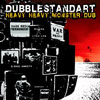 Despite the increasingly dangerous political climate in today's world, especially George W. Bush's America, the majority of major label and underground acts seem almost universally mired down in creating meaningless yet pleasant noise with a groovy beat, catchy vocal hook, or some other attractive characteristic. Altogether rejecting the powerful crosscultural tradition of music as social megaphone, music has turned its back on not only history but the present and future as well. With only a select few independent acts expressing their outrage or concern via creative means, those of us yearning for something with a message often have to look far and wide for something even remotely addressing national/international crises and controversies that truly matter. While 'Heavy Heavy Monster Dub' may not be the most potent cry for social change, that it takes time even referring to the issues is a welcome break from ignorance and apathy. Musically, the group's "positive" sound is refreshing and forward-thinking, with live downtempo breaks and programmed loops acting as backbeat to instruments both traditional and synthesized. Adorning their tracks with thoughtful and provocative names ("Evil Empire" and "Preempive Dub", to name a few) in the footsteps of experimental peers Muslimgauze or Richard H. Kirk, Austrian dub lovers Dubblestandart try to use their time to convey alternative ideas and promote futher exploration and investigation on the part of the listener. "Streets Of Dub" opens the album with an Eastern introduction that quickly meets with a head-nodding rhythm, funky bass guitar line, and carefully placed vocals from Camel. The title track benefits from contributions from dub legends Sly & Robbie and Dillinger, balancing time-honored Jamaican elements with loungey Viennese house beats. Two more remixes of it appear on the album, from Dreadzone and Nick Manasseh respectively, each one pulling their favorite parts together to create two vastly different versions. Mikey Dread and Sonic Colin lend their voices to the funky "Dub Is The Roots," though the Mad Professor mix sounds far more bright and crisp for some reason. Keith LeBlanc's mix of "Terrorists & Inhalers" is more orthodox than most of the cuts here, as is to be expected from this On-U Sound and Tack>>Head veteran, though it still benefits from a few sonic twists and tweaks. Camel reappears towards the end, contributing cautionary vocals to "Watch The Future", an atmospheric delectation with an infectious beat and uplifting melodies and flourishes. Arguably the best new dub album that has come across my desk this year, those of you on the proper "wavelength" or who still haven't ventured beyond The Bug or, dare I say, Bob Marley should seek this one out. - Gary Suarez
Despite the increasingly dangerous political climate in today's world, especially George W. Bush's America, the majority of major label and underground acts seem almost universally mired down in creating meaningless yet pleasant noise with a groovy beat, catchy vocal hook, or some other attractive characteristic. Altogether rejecting the powerful crosscultural tradition of music as social megaphone, music has turned its back on not only history but the present and future as well. With only a select few independent acts expressing their outrage or concern via creative means, those of us yearning for something with a message often have to look far and wide for something even remotely addressing national/international crises and controversies that truly matter. While 'Heavy Heavy Monster Dub' may not be the most potent cry for social change, that it takes time even referring to the issues is a welcome break from ignorance and apathy. Musically, the group's "positive" sound is refreshing and forward-thinking, with live downtempo breaks and programmed loops acting as backbeat to instruments both traditional and synthesized. Adorning their tracks with thoughtful and provocative names ("Evil Empire" and "Preempive Dub", to name a few) in the footsteps of experimental peers Muslimgauze or Richard H. Kirk, Austrian dub lovers Dubblestandart try to use their time to convey alternative ideas and promote futher exploration and investigation on the part of the listener. "Streets Of Dub" opens the album with an Eastern introduction that quickly meets with a head-nodding rhythm, funky bass guitar line, and carefully placed vocals from Camel. The title track benefits from contributions from dub legends Sly & Robbie and Dillinger, balancing time-honored Jamaican elements with loungey Viennese house beats. Two more remixes of it appear on the album, from Dreadzone and Nick Manasseh respectively, each one pulling their favorite parts together to create two vastly different versions. Mikey Dread and Sonic Colin lend their voices to the funky "Dub Is The Roots," though the Mad Professor mix sounds far more bright and crisp for some reason. Keith LeBlanc's mix of "Terrorists & Inhalers" is more orthodox than most of the cuts here, as is to be expected from this On-U Sound and Tack>>Head veteran, though it still benefits from a few sonic twists and tweaks. Camel reappears towards the end, contributing cautionary vocals to "Watch The Future", an atmospheric delectation with an infectious beat and uplifting melodies and flourishes. Arguably the best new dub album that has come across my desk this year, those of you on the proper "wavelength" or who still haven't ventured beyond The Bug or, dare I say, Bob Marley should seek this one out. - Gary Suarez
samples:
Bill Laswell, "Version 2 Version"
ROIR
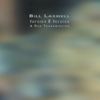 Focus and cocentration are absolutely essential to this album. Without those two features, all of these songs would've probably turned out like the ones on Aftermathematics Instrumental. The ingredients on this record are simple, though: heavy and waving bass melodies, steady percussion, and a just hint of the sexual. An overwhelming sense of dark, seductive power hovers over Version 2 Version the instant the bass drops on "Dystopia" and it only intensifies until "Night City" and "System Malfunction" close the record up. The music is fairly inconspicuous so far as dub is concerned, but the atmoshpherics that Laswell and company manage to pull out of their instruments are astounding. "Babylon Site" not only struts along as though it were untouchable and utterly of another world, it also rings and pulses with the soul of ease and promiscuity. The sexual references can't be helped; I half expect that this album was recorded in a dark and damp basement to the images of lusty encounter. Hi-hats chirp and stutter with the silk playing of electric guitars and classic dub sounds. There's enough reverb and echo on most of these songs to send any sober listener into a realm of cosmic light shows and slow motion existence. The gritty sounds that are coaxed out of the instruments and the almost too pure stream of sound effects make an otherwise typical dub record sound exceptional. There's nothing but pure, throbbing tones on this record with occaisional use of a bouncing keyboard or a guitar moaning itself to death. The sparse use of tabla rhythms and vocal effects help keep the mood of the record unpredictable. When "Night City" and its spazzed out rhythm section blew up at the end of "Babylon Site," I was thoroughly surprised. I'm not talking about a huge jump stylistically, but Laswell tweaked the mood just enough to keep me listening through the record. The sci-fi closer is a gem of groove production. "System Malfunction" rolls along like a steam train powered by the heart and soul of reggae and hot summer nights. Instead of trying to do a thousand things at once and make every song significantly different from one another, Laswell has kept things tight and uniform. The result is an album a hundred times better than the last one I listened to from him. - Lucas Schleicher
Focus and cocentration are absolutely essential to this album. Without those two features, all of these songs would've probably turned out like the ones on Aftermathematics Instrumental. The ingredients on this record are simple, though: heavy and waving bass melodies, steady percussion, and a just hint of the sexual. An overwhelming sense of dark, seductive power hovers over Version 2 Version the instant the bass drops on "Dystopia" and it only intensifies until "Night City" and "System Malfunction" close the record up. The music is fairly inconspicuous so far as dub is concerned, but the atmoshpherics that Laswell and company manage to pull out of their instruments are astounding. "Babylon Site" not only struts along as though it were untouchable and utterly of another world, it also rings and pulses with the soul of ease and promiscuity. The sexual references can't be helped; I half expect that this album was recorded in a dark and damp basement to the images of lusty encounter. Hi-hats chirp and stutter with the silk playing of electric guitars and classic dub sounds. There's enough reverb and echo on most of these songs to send any sober listener into a realm of cosmic light shows and slow motion existence. The gritty sounds that are coaxed out of the instruments and the almost too pure stream of sound effects make an otherwise typical dub record sound exceptional. There's nothing but pure, throbbing tones on this record with occaisional use of a bouncing keyboard or a guitar moaning itself to death. The sparse use of tabla rhythms and vocal effects help keep the mood of the record unpredictable. When "Night City" and its spazzed out rhythm section blew up at the end of "Babylon Site," I was thoroughly surprised. I'm not talking about a huge jump stylistically, but Laswell tweaked the mood just enough to keep me listening through the record. The sci-fi closer is a gem of groove production. "System Malfunction" rolls along like a steam train powered by the heart and soul of reggae and hot summer nights. Instead of trying to do a thousand things at once and make every song significantly different from one another, Laswell has kept things tight and uniform. The result is an album a hundred times better than the last one I listened to from him. - Lucas Schleicher
samples:
PIXELTAN, "GET UP/SAY WHAT (DFA REMIX)"
DFA
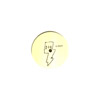 Pixeltan have been kicking around since 2001, but haven't been heard from much, releasing only a self-produced EP and a track on the epochal Troubleman Mix Tape. Pixeltan members include Devin Flynn and Mika Yonata of Plate Tectonics, and Hisham Bharoocha, ex-drummer for Black Dice. This new 33 RPM disc of white-label DJ vinyl should rectify the group's obscurity, as it's being released by the eternally name-checked DFA label. It's a typical DFA production through-and-through, pushing a relentless adrenaline-pumped 4/4 snarescape with thick, throbbing basslines and subsonic booty blasts. "Get Up/Say What (DFA Remix)" is the main attraction, a nine-minute marriage of two Pixeltan tracks given the death disco once-over by James Murphy and Tim Goldsworthy. Mika's sassy growls and shrieks are echoplexed into dubby oblivion, nodding in the direction of The Slits, but as she continues to yell "So what?" repeatedly, she ends up closer to "Me and My Rhythm Box" from cult film Liquid Sky. And here as always, the DFA team adds a druggy vibe to the proceedings, filling the track out with pupil-dilating whacks of synth and fluttering, lightheaded MDMA shudders. Side B is filled out with the original version of "Get Up" and another track called "That's the Way I Like It," both fun, but lacking the sexy urban hedonism of Side A. With "Get Up/Say What," however, Pixeltan and DFA have created another breathless dancefloor-filler, destined to be the set-ending track at every Williamsburg loft party for at least the next two weeks. - Jonathan Dean
Pixeltan have been kicking around since 2001, but haven't been heard from much, releasing only a self-produced EP and a track on the epochal Troubleman Mix Tape. Pixeltan members include Devin Flynn and Mika Yonata of Plate Tectonics, and Hisham Bharoocha, ex-drummer for Black Dice. This new 33 RPM disc of white-label DJ vinyl should rectify the group's obscurity, as it's being released by the eternally name-checked DFA label. It's a typical DFA production through-and-through, pushing a relentless adrenaline-pumped 4/4 snarescape with thick, throbbing basslines and subsonic booty blasts. "Get Up/Say What (DFA Remix)" is the main attraction, a nine-minute marriage of two Pixeltan tracks given the death disco once-over by James Murphy and Tim Goldsworthy. Mika's sassy growls and shrieks are echoplexed into dubby oblivion, nodding in the direction of The Slits, but as she continues to yell "So what?" repeatedly, she ends up closer to "Me and My Rhythm Box" from cult film Liquid Sky. And here as always, the DFA team adds a druggy vibe to the proceedings, filling the track out with pupil-dilating whacks of synth and fluttering, lightheaded MDMA shudders. Side B is filled out with the original version of "Get Up" and another track called "That's the Way I Like It," both fun, but lacking the sexy urban hedonism of Side A. With "Get Up/Say What," however, Pixeltan and DFA have created another breathless dancefloor-filler, destined to be the set-ending track at every Williamsburg loft party for at least the next two weeks. - Jonathan Dean
samples:
J.O.Y., "SUNPLUS"
DFA
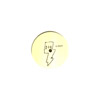 K.U.D.O. from Unkle, Kan Takagi of Major Force and Yoshimi P-We of The Boredoms/OOIOO together make up J.O.Y., the group behind this eccentric new single on DFA. J.O.Y.'s "Sunplus" is a percussive samba dance excursion, a wacked-out psychedelic version of the theme song to George of the Jungle. Sharing the brightly-colored, hyperkinetic qualities of J-Pop superstar group Puffy AmiYumi, J.O.Y. incorporate a dizzying assemblage of eclectic instrumentation—xylophones, steel drum, synthesized handclaps and a room full of bells and percussion—to achieve their unique sound. "Sunplus" would not sound out of place on Yamatsuka Eye's short-attention-span DJ Pica Pica Pica mix CD, with its hyperactive atmosphere and manic rhythms. DFA's remix takes up Side B of this 45 RPM single, brilliantly reworking the song into a more jagged, aggressive dance-punk track. By filtering out some of the anarchic clatter of J.O.Y.'s original, Murphy and Goldsworthy streamline the track and add some forward momentum, highlighting Yoshimi's punkish vocals and upping the cowbell quotient by several degrees. Together with the earlier EYE Remix of Black Dice's "Endless Happiness" (on the B-Side of the Cone Toaster single), DFA has put out some of the most joyously unclassifiable Japanese experimental pop since Asa Chang & Junray's Song Chang. - Jonathan Dean
K.U.D.O. from Unkle, Kan Takagi of Major Force and Yoshimi P-We of The Boredoms/OOIOO together make up J.O.Y., the group behind this eccentric new single on DFA. J.O.Y.'s "Sunplus" is a percussive samba dance excursion, a wacked-out psychedelic version of the theme song to George of the Jungle. Sharing the brightly-colored, hyperkinetic qualities of J-Pop superstar group Puffy AmiYumi, J.O.Y. incorporate a dizzying assemblage of eclectic instrumentation—xylophones, steel drum, synthesized handclaps and a room full of bells and percussion—to achieve their unique sound. "Sunplus" would not sound out of place on Yamatsuka Eye's short-attention-span DJ Pica Pica Pica mix CD, with its hyperactive atmosphere and manic rhythms. DFA's remix takes up Side B of this 45 RPM single, brilliantly reworking the song into a more jagged, aggressive dance-punk track. By filtering out some of the anarchic clatter of J.O.Y.'s original, Murphy and Goldsworthy streamline the track and add some forward momentum, highlighting Yoshimi's punkish vocals and upping the cowbell quotient by several degrees. Together with the earlier EYE Remix of Black Dice's "Endless Happiness" (on the B-Side of the Cone Toaster single), DFA has put out some of the most joyously unclassifiable Japanese experimental pop since Asa Chang & Junray's Song Chang. - Jonathan Dean
samples:
808 State, "new order acid house mixes"
Replhex
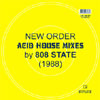 Don't be fooled by the appearance of New Order nor the word "mixes" in the title of this record. These are essentially two reinterpretations of two of New Order's most important songs "Confusion" and "Blue Monday" by fellow Mancunians 808 State. What could easily be correct on the cover, however, is that these date back to 1988, a time in which 808 State was synching their Roland 808, 909 and 303 together, letting the machines take center stage. As far as my ears can tell, there are absolutely no sounds from New Order's recording used in the process, and that's probably a good thing, as the songs have been remixed and remixed and remixed and remixed to the point of violent nausea. 808 State's versions to me sound like cover tunes, where Graham Massey and company are practicing with equipment or approaches that were new to them after years of playing rock music as Biting Tongues. There's a couple possible reasons these didn't surface on a widescale level sixteen years ago: the group might not have been confident enough with the recordings at the time; New Order's international stardom could have demanded much more money than 808 State could afford; the vocals might not have been quite what the 12" acid house market demanded (that "yeah" sample in "Blue Monday" and the "Confusion" sample both grate on the nerves after a few minutes); or there was already a saturated market of New Order remixes kicking around. Now, sixteen years later, the songs are certainly more "vintage" (or as LCD Soundsytem would put it "borrowed nostalgia for the unremembered 80s"). Both versions are pure and blissful, with a bare minimal amount of vocals included. They bear little resemblance to the original versions, aside from recognizable bass lines, and act as a strong precursor to the next vault release of 808 State on Rephlex, Prebuild, (a collection of the songs which pre-date Newbuild). For people expecting the wailing sax and melodic mastery from albums like Ninety and Ex:el, this 12" will probably be a disappointment, but for those looking for hynotic acid house techno and don't mind New Order will probably find a mild amount of joy within the grooves. - Jon Whitney
Don't be fooled by the appearance of New Order nor the word "mixes" in the title of this record. These are essentially two reinterpretations of two of New Order's most important songs "Confusion" and "Blue Monday" by fellow Mancunians 808 State. What could easily be correct on the cover, however, is that these date back to 1988, a time in which 808 State was synching their Roland 808, 909 and 303 together, letting the machines take center stage. As far as my ears can tell, there are absolutely no sounds from New Order's recording used in the process, and that's probably a good thing, as the songs have been remixed and remixed and remixed and remixed to the point of violent nausea. 808 State's versions to me sound like cover tunes, where Graham Massey and company are practicing with equipment or approaches that were new to them after years of playing rock music as Biting Tongues. There's a couple possible reasons these didn't surface on a widescale level sixteen years ago: the group might not have been confident enough with the recordings at the time; New Order's international stardom could have demanded much more money than 808 State could afford; the vocals might not have been quite what the 12" acid house market demanded (that "yeah" sample in "Blue Monday" and the "Confusion" sample both grate on the nerves after a few minutes); or there was already a saturated market of New Order remixes kicking around. Now, sixteen years later, the songs are certainly more "vintage" (or as LCD Soundsytem would put it "borrowed nostalgia for the unremembered 80s"). Both versions are pure and blissful, with a bare minimal amount of vocals included. They bear little resemblance to the original versions, aside from recognizable bass lines, and act as a strong precursor to the next vault release of 808 State on Rephlex, Prebuild, (a collection of the songs which pre-date Newbuild). For people expecting the wailing sax and melodic mastery from albums like Ninety and Ex:el, this 12" will probably be a disappointment, but for those looking for hynotic acid house techno and don't mind New Order will probably find a mild amount of joy within the grooves. - Jon Whitney
samples:
Fat Day, "Unf! Unf!"
Load
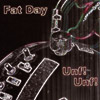 I'm sitting here laughing my ass off at this record. It's 17 minutes, 23 tracks in length, completely out of a control, and absolutely hilarious. I've heard lots of thrash and smash musicians and I enjoy a lot of their music, but every record I've heard that is bound and determined to rip through thirty songs in under half an hour have a certain attitude that doesn't warrant laughter. Fat Day are a bit different; in between the 20 and 30 second songs on this disc are strange eight-bit Nintendo sonatas. These little doodles of electronic buzzery and near-organ origin provide little bits of relief from the drum-banging, guitar-eating, vocal lacerations that are the rest of the album. It is, at times, impossible not to laugh at how silly this all is. Despite the fact that there are five tracks between the opening organ piece and the second bit of relief on the album, it sounds as though there is one song playing and it just happens to be riddled with sudden bleats of compositional hyperactivity and vomiting energy. I'm trying to imagine what this band must look like on stage and all I can see is the image of a head exploding or a cow being run over by a monster truck. Unf! Unf! isn't a particularly heavy album; there are certainly denser, more rhythmically tight songs out there. Fat Day, however, take that musical nastiness and transform it into a spurt of energy so outrageous that it can't be considered anything more than slap-stick. This is massively entertaining slap-stick, though. I've listened to this short and sweet record about five times in a row now and I haven't gotten sick of it. The honks and squeaks of the organ-like pieces always highlight some kind of insufficiency that reminds me of circus clowns or freak shows and the grating guitar, drum, and voice pieces always rock out in a satisfyingly primal way. I'm not sure how, but some of these tunes have gotten stuck in my head and I find myself half-gyrating in an attempt to reproduce the rhythms and half-melodies on some of the songs. If I had the ability to stop smiling and laughing while listening to the record then I might actually attempt to bark along some of the lyrics, but it's just more fun to sit back and watch the insanity progress all by itself. - Lucas Schleicher
I'm sitting here laughing my ass off at this record. It's 17 minutes, 23 tracks in length, completely out of a control, and absolutely hilarious. I've heard lots of thrash and smash musicians and I enjoy a lot of their music, but every record I've heard that is bound and determined to rip through thirty songs in under half an hour have a certain attitude that doesn't warrant laughter. Fat Day are a bit different; in between the 20 and 30 second songs on this disc are strange eight-bit Nintendo sonatas. These little doodles of electronic buzzery and near-organ origin provide little bits of relief from the drum-banging, guitar-eating, vocal lacerations that are the rest of the album. It is, at times, impossible not to laugh at how silly this all is. Despite the fact that there are five tracks between the opening organ piece and the second bit of relief on the album, it sounds as though there is one song playing and it just happens to be riddled with sudden bleats of compositional hyperactivity and vomiting energy. I'm trying to imagine what this band must look like on stage and all I can see is the image of a head exploding or a cow being run over by a monster truck. Unf! Unf! isn't a particularly heavy album; there are certainly denser, more rhythmically tight songs out there. Fat Day, however, take that musical nastiness and transform it into a spurt of energy so outrageous that it can't be considered anything more than slap-stick. This is massively entertaining slap-stick, though. I've listened to this short and sweet record about five times in a row now and I haven't gotten sick of it. The honks and squeaks of the organ-like pieces always highlight some kind of insufficiency that reminds me of circus clowns or freak shows and the grating guitar, drum, and voice pieces always rock out in a satisfyingly primal way. I'm not sure how, but some of these tunes have gotten stuck in my head and I find myself half-gyrating in an attempt to reproduce the rhythms and half-melodies on some of the songs. If I had the ability to stop smiling and laughing while listening to the record then I might actually attempt to bark along some of the lyrics, but it's just more fun to sit back and watch the insanity progress all by itself. - Lucas Schleicher
samples:
Asobi Seksu
Friendly Fire
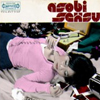 A kaleidoscope of influences, sounds, languages, and dynamics comprise the rich set of tools available to New York City's Asobi Seksu. The band finds themselves awash in this clash of intentions with the ability to sort through the competitive and contradictory urges to develop a consonant sound that is more than the sum of its parts. Singer Yuki Chikudate injects each song with a unique tone, at times distinctly assertive or adorably dreamy while oscillating between English and Japanese in search of the perfect way to express the feeling of the song. The band emerges from this melting pot of attitudes as a less oblique My Bloody Valentine, sharing that group's penchant for vibrant aural fireworks amidst dreamy melodies. The soaring stabs of guitar in "Sooner" demonstrate that this similarity is not just in the name of the song. The band launches off into those jags while managing to weave in a delicate clarity in the verses, the band's own personality taking hold in these calm breaks from the squalls. "Stay" is a slow, aching duet between Yuki and guitarist James Hanna that unfolds itself slowly and methodically. It's an intimate moment on tape as they breathlessly coo amidst a milieu of starry, reverb soaked chords. The pristine manner that makes the song fit for a polite slow dance is dashed away as they guitars begin to climb and blur out into a fuzzy wash of vivid sound, amplifying the indistinct intensity of the private moment before plummeting back into the grips of sensual acuity. "I'm Happy But You Don't Like Me" eschews the dramatics of shoegazing for a more direct synthesis of contemporary indie rock and Japanese pop. The song doesn't fail to snare the ear, turning the language barrier into a weapon against itself as they syllabic melodies contribute greatly to the song's memorability. Hanna takes the lead vocals on "Let Them Wait" and the album closer, "Before We Fall," managing to hold his own against Chikudate's relentlessly endearing presence. The pair of songs make a great case for the viability of Asobi Seksu, another indicator of the band's ability to approach their music from a number of different angles, dexterously employing variations on their sound, structure, and delivery to create a product that is never predictable. - Michael Patrick Brady
A kaleidoscope of influences, sounds, languages, and dynamics comprise the rich set of tools available to New York City's Asobi Seksu. The band finds themselves awash in this clash of intentions with the ability to sort through the competitive and contradictory urges to develop a consonant sound that is more than the sum of its parts. Singer Yuki Chikudate injects each song with a unique tone, at times distinctly assertive or adorably dreamy while oscillating between English and Japanese in search of the perfect way to express the feeling of the song. The band emerges from this melting pot of attitudes as a less oblique My Bloody Valentine, sharing that group's penchant for vibrant aural fireworks amidst dreamy melodies. The soaring stabs of guitar in "Sooner" demonstrate that this similarity is not just in the name of the song. The band launches off into those jags while managing to weave in a delicate clarity in the verses, the band's own personality taking hold in these calm breaks from the squalls. "Stay" is a slow, aching duet between Yuki and guitarist James Hanna that unfolds itself slowly and methodically. It's an intimate moment on tape as they breathlessly coo amidst a milieu of starry, reverb soaked chords. The pristine manner that makes the song fit for a polite slow dance is dashed away as they guitars begin to climb and blur out into a fuzzy wash of vivid sound, amplifying the indistinct intensity of the private moment before plummeting back into the grips of sensual acuity. "I'm Happy But You Don't Like Me" eschews the dramatics of shoegazing for a more direct synthesis of contemporary indie rock and Japanese pop. The song doesn't fail to snare the ear, turning the language barrier into a weapon against itself as they syllabic melodies contribute greatly to the song's memorability. Hanna takes the lead vocals on "Let Them Wait" and the album closer, "Before We Fall," managing to hold his own against Chikudate's relentlessly endearing presence. The pair of songs make a great case for the viability of Asobi Seksu, another indicator of the band's ability to approach their music from a number of different angles, dexterously employing variations on their sound, structure, and delivery to create a product that is never predictable. - Michael Patrick Brady
samples:
Wolf Eyes, "Burned Mind"
Sub Pop
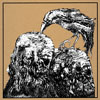 As I watched Throbbing Gristle perform for the first time in over two decades, many thoughts rushed through my head. The one which is most relevant to this review is that I believe the most popular aggressive, noisy acts who get heralded for their "experimentalism" actually exploit the most simple tactics. While the audience on the floor was thrilled to be there, loving every minute of TG's set from the (false!) start, it was the beats that drove them nuts. People love beats and they love repetition. They love to sing along when they know the words that are coming up and they love to pound fists into the air and dance. Wolf Eyes' signing to Sub Pop isn't all that strange given they've perhaps got a lot more commercial potential than other friends/comrades such as Black Dice and Animal Collective, since they embrace beats to such a blistering degree. The disc opens with the brief cacophonous intro "Dead in a Boat," an all-out white noise to the wall hate fest, then launches into their feel good hit of the summer, the pouding and pulsing "Stabbed In the Face." After another short beat-less piece, the group come back with "Village Oblivia," another fists in the air dance fest. Another brief track bridges the album to the next full-realized song, "Rattlesnake Shake," and this time it's as if Wolf Eyes are scoring a brutally vicious nightmare. The low rumble is like an oversized military aircraft piercing the night, eager to unleash destruction. At high enough volumes I'm sure the hum is enough to shake wax from the ears. Don't expect to be singing along with Wolf Eyes tunes easily, however, as the occasional vocal appearances are put through the same junk pile of machines that create the rest of the gritty audio sludge on their records. The album sort of ends with the almost party jam of "Black Vomit." Here, the full, rich sound of noises coupled with abrasive vocals easily makes nearly every single post-post-post-post industrial "musician" (picture black pants with tons of zippers) look like a pussy. Wolf Eyes have done something many bands have tried to achieve but fell short: make something evil enough to irritate parents (just as soon as they've finally accepted metal and hip hop) and both dirty and sexy enough for the ultimate release. - Jon Whitney
As I watched Throbbing Gristle perform for the first time in over two decades, many thoughts rushed through my head. The one which is most relevant to this review is that I believe the most popular aggressive, noisy acts who get heralded for their "experimentalism" actually exploit the most simple tactics. While the audience on the floor was thrilled to be there, loving every minute of TG's set from the (false!) start, it was the beats that drove them nuts. People love beats and they love repetition. They love to sing along when they know the words that are coming up and they love to pound fists into the air and dance. Wolf Eyes' signing to Sub Pop isn't all that strange given they've perhaps got a lot more commercial potential than other friends/comrades such as Black Dice and Animal Collective, since they embrace beats to such a blistering degree. The disc opens with the brief cacophonous intro "Dead in a Boat," an all-out white noise to the wall hate fest, then launches into their feel good hit of the summer, the pouding and pulsing "Stabbed In the Face." After another short beat-less piece, the group come back with "Village Oblivia," another fists in the air dance fest. Another brief track bridges the album to the next full-realized song, "Rattlesnake Shake," and this time it's as if Wolf Eyes are scoring a brutally vicious nightmare. The low rumble is like an oversized military aircraft piercing the night, eager to unleash destruction. At high enough volumes I'm sure the hum is enough to shake wax from the ears. Don't expect to be singing along with Wolf Eyes tunes easily, however, as the occasional vocal appearances are put through the same junk pile of machines that create the rest of the gritty audio sludge on their records. The album sort of ends with the almost party jam of "Black Vomit." Here, the full, rich sound of noises coupled with abrasive vocals easily makes nearly every single post-post-post-post industrial "musician" (picture black pants with tons of zippers) look like a pussy. Wolf Eyes have done something many bands have tried to achieve but fell short: make something evil enough to irritate parents (just as soon as they've finally accepted metal and hip hop) and both dirty and sexy enough for the ultimate release. - Jon Whitney
samples:
WHITELODGE
Beta-Lactam Ring
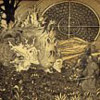 This is the debut full-length album for Whitelodge, a trio ensconced deep in Florida's panhandle, an area known for mosquitoes, extreme humidity and torrential rains, an area recently attacked by a series of forceful hurricanes. These extremes of nature seem to have exerted an influence on Whitelodge's music, moving as it does through seasonal movements: the hazy, psychedelic buzzing of summer insects, the golden autumnal harvest, the skeletal frost of winter; and the rebirth of pastoral springtime. The lyrics are fraught with references to earth and the elements, and the soundworld of each song is alive with atmospherics to match the poetic imagery. And despite the innocuous magickal temple invoked by the band name, there are deep undercurrents of darkness and unrest lurking in the underbrush. Whitelodge are clearly indebted to that outcropping of English esoteric psychedelia that includes Current 93 and Death In June, but their geographic and generational differences from their progenitors position them in unique territory. Instead of filtering their inspirations through the post-industrial milieu that those earlier bands were working in, Whitelodge utilize more modern reference points like My Bloody Valentine and Godspeed You Black Emperor. They add layers of instrumental and textural sophistication to these elegiac songs of isolation and melancholy, reveling in slowly percolating melodies and layers of drones. The insistent strum of the acoustic guitar, lost in cavernous echo, reminded me of the richly detailed sound of Death In June's But What Ends When the Symbols Shatter. Just to cement the comparison, Whitelodge even manage to incorporate some Ennio Morricone steel guitar belts and the odd trumpet solo on a few tracks. Singer Dustin Gilbert's voice is slow and restrained, and on occasion (as in the spooky "Of Corridors and Time") his vocals are processed and elongated into scary mutations. Occasional passages of cheap vintage electronics and drum machine reminded me of early Pink Dots, as on "Song For Kalyx," a hallucinogenic meditation on lost love. Whitelodge's debut is the sort of record that is so subtle and nuanced, it's likely to be completely lost amidst the overpopulated indie scene, which is regrettable, to say the least. - Jonathan Dean
This is the debut full-length album for Whitelodge, a trio ensconced deep in Florida's panhandle, an area known for mosquitoes, extreme humidity and torrential rains, an area recently attacked by a series of forceful hurricanes. These extremes of nature seem to have exerted an influence on Whitelodge's music, moving as it does through seasonal movements: the hazy, psychedelic buzzing of summer insects, the golden autumnal harvest, the skeletal frost of winter; and the rebirth of pastoral springtime. The lyrics are fraught with references to earth and the elements, and the soundworld of each song is alive with atmospherics to match the poetic imagery. And despite the innocuous magickal temple invoked by the band name, there are deep undercurrents of darkness and unrest lurking in the underbrush. Whitelodge are clearly indebted to that outcropping of English esoteric psychedelia that includes Current 93 and Death In June, but their geographic and generational differences from their progenitors position them in unique territory. Instead of filtering their inspirations through the post-industrial milieu that those earlier bands were working in, Whitelodge utilize more modern reference points like My Bloody Valentine and Godspeed You Black Emperor. They add layers of instrumental and textural sophistication to these elegiac songs of isolation and melancholy, reveling in slowly percolating melodies and layers of drones. The insistent strum of the acoustic guitar, lost in cavernous echo, reminded me of the richly detailed sound of Death In June's But What Ends When the Symbols Shatter. Just to cement the comparison, Whitelodge even manage to incorporate some Ennio Morricone steel guitar belts and the odd trumpet solo on a few tracks. Singer Dustin Gilbert's voice is slow and restrained, and on occasion (as in the spooky "Of Corridors and Time") his vocals are processed and elongated into scary mutations. Occasional passages of cheap vintage electronics and drum machine reminded me of early Pink Dots, as on "Song For Kalyx," a hallucinogenic meditation on lost love. Whitelodge's debut is the sort of record that is so subtle and nuanced, it's likely to be completely lost amidst the overpopulated indie scene, which is regrettable, to say the least. - Jonathan Dean
samples:
GREEN MILK FROM THE PLANET ORANGE, "HE'S CRYING 'LOOK'"
Beta-Lactam Ring
 The last thing the world needs now is another avant-leaning Japanese psychedelic rock band, especially one with a name as silly and long-winded as Green Milk From the Planet Orange. Their name, besides being a serious impediment to success, sounds like it could be an unpublished manuscript by Dr. Seuss, one of those later works his editor refused to publish because it contained overt drug references. The album is called He's Crying "Look," a cruel juvenile chant which dredged up a whole reservoir of buried childhood trauma that I'd rather not go into right now. The band is a threesome made up of single letter names: K on vocals and guitar, T on bass and A on drums and everything else. Their sound is a looser, less gelled version of Japanese psych-rock group Ghost. Long passages of low-fidelity folk-rock and hushed, muddled vocals (in English, sort of) give way to sudden explosions of incendiary acid rock. T's complex, jazz-influenced bass playing is central to the band's dynamic, by turns melodic and funky. There are areas of straight psych-out too, as in the middle of "When Every Color Turns Black," which at times has the flavor of Pink Floyd's "Set the Controls for the Heart of the Sun." There are five tracks on the album, with three of the tracks stretching to epic side length. The lengthier tracks are by far the most enjoyable, moving from quiet ambient improvisation to sudden overamped freakouts with mercurial haphazardness. There are many times on the album where it feels like the band is floundering to find footing, but these moments are balanced with enough good stuff to keep me engaged. Towards the middle of the 18-minute "U-Boat," K yells a bunch of creepy Japanese stuff into a megaphone as K and T build momentum with drum rolls and urgent bass. Then there's a countdown (I think) and the song explodes into an extended King Crimson-style bass and fuzz guitar interplay. Perhaps I am a hopeless dork, but I find this sort of thing irresistible. Ultimately, the quality that sets GMFTPO apart from many of their fellow Japanese psych-rockers is the uncalculated nature of the music. At no point do I feel, as I often do with Acid Mothers Temple, that I am hearing the idea of a song rather than an actual song. At their best and worst, I get the feeling that GMFTPO are playing the kind of music that they love, and they are not allowing things like taste or restraint to intermediate (which is a good thing). - Jonathan Dean
The last thing the world needs now is another avant-leaning Japanese psychedelic rock band, especially one with a name as silly and long-winded as Green Milk From the Planet Orange. Their name, besides being a serious impediment to success, sounds like it could be an unpublished manuscript by Dr. Seuss, one of those later works his editor refused to publish because it contained overt drug references. The album is called He's Crying "Look," a cruel juvenile chant which dredged up a whole reservoir of buried childhood trauma that I'd rather not go into right now. The band is a threesome made up of single letter names: K on vocals and guitar, T on bass and A on drums and everything else. Their sound is a looser, less gelled version of Japanese psych-rock group Ghost. Long passages of low-fidelity folk-rock and hushed, muddled vocals (in English, sort of) give way to sudden explosions of incendiary acid rock. T's complex, jazz-influenced bass playing is central to the band's dynamic, by turns melodic and funky. There are areas of straight psych-out too, as in the middle of "When Every Color Turns Black," which at times has the flavor of Pink Floyd's "Set the Controls for the Heart of the Sun." There are five tracks on the album, with three of the tracks stretching to epic side length. The lengthier tracks are by far the most enjoyable, moving from quiet ambient improvisation to sudden overamped freakouts with mercurial haphazardness. There are many times on the album where it feels like the band is floundering to find footing, but these moments are balanced with enough good stuff to keep me engaged. Towards the middle of the 18-minute "U-Boat," K yells a bunch of creepy Japanese stuff into a megaphone as K and T build momentum with drum rolls and urgent bass. Then there's a countdown (I think) and the song explodes into an extended King Crimson-style bass and fuzz guitar interplay. Perhaps I am a hopeless dork, but I find this sort of thing irresistible. Ultimately, the quality that sets GMFTPO apart from many of their fellow Japanese psych-rockers is the uncalculated nature of the music. At no point do I feel, as I often do with Acid Mothers Temple, that I am hearing the idea of a song rather than an actual song. At their best and worst, I get the feeling that GMFTPO are playing the kind of music that they love, and they are not allowing things like taste or restraint to intermediate (which is a good thing). - Jonathan Dean
samples:
"2%"
Reduced Phat
 From the newly formed label, Reduced Phat, comes this anti-compilation, various artists release that announces the label's intent with gusto. I say "anti-compilation" because unlike most label comps that throw in everything that's passable that washes up on their shores, the Reduced Phat manifesto calls for paying attention only to the very cream of the crop of possible artists and releases that are all struggling to be heard. Featuring two tracks and two remixes a piece from Enduser, Edgey, and Subsektor, the disc feels more like a fun exchange between a VIP group of like-minded artists than a collection of random and disconnected tracks from whomever happens to be out there. Starting with Enduser's unabashed homage to Lush, 2% quickly kicks into high gear and doesn't relent for five and a half tracks until a break in Edgey's "Indigna" calms things down for laughs. Enduser brings his road-tested production to the mix with his two splintered originals and remixes for his partners that eviscerate and then reconstruct their grooves with demented jungle abandon. Subsektor offers up the most straightforward take on hard drum n bass, but his tracks are no less confrontational. Edgey's superb reworking of "Death Vest" into a hard stomping mid-tempo piece is probably my favorite track, but Enduser's treatment of Subsektor's "The Breed" is equally fun and shows once again why Enduser is the master at mashed up drum n bass madness. Clocking in at just over an hour for 12 tracks, 2% provides all the essential breaks and bass without cluttering the mix with disposable or throw-away tracks. Edgey brings the weirdness, Enduser fractures the beats, and Subsektor provides the hooks and it all works without ever sounding like too much. As much as I liked the Carbon compilation that approached breakbeat music with a similar sensibility, this record feels more coherent and less kitchen sink. Whenever a new label jumps into the game of releasing records into a market that is increasingly unfriendly to physical CDs and untested products and brands, I get a little nervous. When the releases are as good as this one though, I can only hope enough people take notice to make the enterprise the success it deserves to be.- Matthew Jeanes
From the newly formed label, Reduced Phat, comes this anti-compilation, various artists release that announces the label's intent with gusto. I say "anti-compilation" because unlike most label comps that throw in everything that's passable that washes up on their shores, the Reduced Phat manifesto calls for paying attention only to the very cream of the crop of possible artists and releases that are all struggling to be heard. Featuring two tracks and two remixes a piece from Enduser, Edgey, and Subsektor, the disc feels more like a fun exchange between a VIP group of like-minded artists than a collection of random and disconnected tracks from whomever happens to be out there. Starting with Enduser's unabashed homage to Lush, 2% quickly kicks into high gear and doesn't relent for five and a half tracks until a break in Edgey's "Indigna" calms things down for laughs. Enduser brings his road-tested production to the mix with his two splintered originals and remixes for his partners that eviscerate and then reconstruct their grooves with demented jungle abandon. Subsektor offers up the most straightforward take on hard drum n bass, but his tracks are no less confrontational. Edgey's superb reworking of "Death Vest" into a hard stomping mid-tempo piece is probably my favorite track, but Enduser's treatment of Subsektor's "The Breed" is equally fun and shows once again why Enduser is the master at mashed up drum n bass madness. Clocking in at just over an hour for 12 tracks, 2% provides all the essential breaks and bass without cluttering the mix with disposable or throw-away tracks. Edgey brings the weirdness, Enduser fractures the beats, and Subsektor provides the hooks and it all works without ever sounding like too much. As much as I liked the Carbon compilation that approached breakbeat music with a similar sensibility, this record feels more coherent and less kitchen sink. Whenever a new label jumps into the game of releasing records into a market that is increasingly unfriendly to physical CDs and untested products and brands, I get a little nervous. When the releases are as good as this one though, I can only hope enough people take notice to make the enterprise the success it deserves to be.- Matthew Jeanes
samples:
We know that our music picks may be somewhat challenging to find, which is why we have a community section which can be used to obtain nearly everything available on this site. |